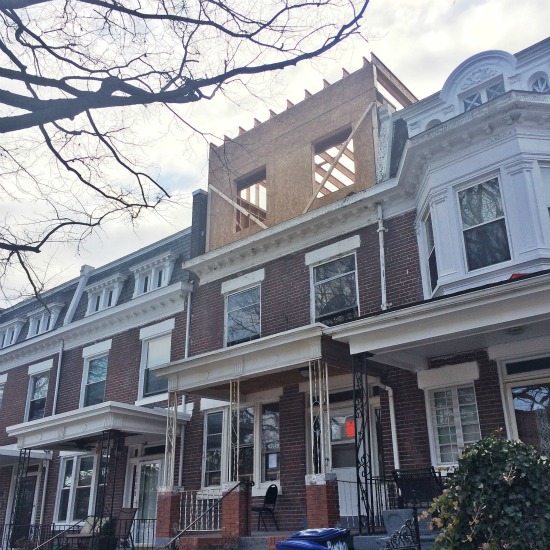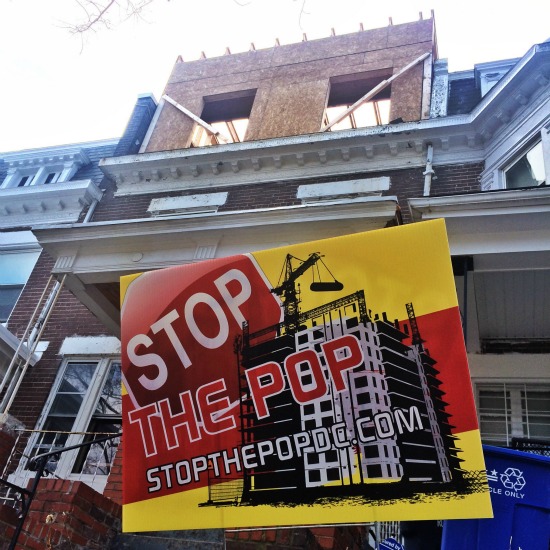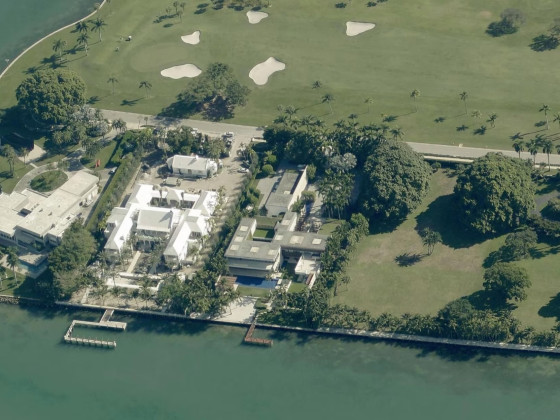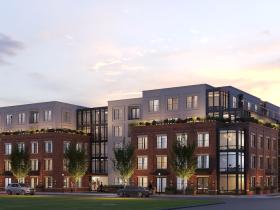What's Hot: Did January Mark The Bottom For The DC-Area Housing Market? | The Roller Coaster Development Scene In Tenleytown and AU Park
 DC's Pop-Up Proposal Brings Heated Debate to Zoning Commission
DC's Pop-Up Proposal Brings Heated Debate to Zoning Commission
✉️ Want to forward this article? Click here.

A pop-up on Buchanan Street NW.
A proposal to limit residential pop-ups in the District went before the Zoning Commission on Thursday night in a contentious hearing that was ultimately extended to February because so many people showed up to speak for and against the plan.
The Office of Planning (OP) is proposing rules it says would limit the increasingly common pop-ups, residences which rise above DC’s iconic rowhouses and are frequently used to enable two-unit conversions of single-family homes.
Here’s a quick primer on what the Office of Planning has proposed for the city’s R-4 zones:
Note: R-4 districts in DC permit matter-of-right development of single-family residential uses (including detached, semi-detached, row dwellings, and flats), churches and public schools.
- Height: Planning wants to limit by-right height in R-4 zones to 35 feet, with homes up to 40 feet allowed by special exception. Roof structures on detached, rowhouse and residential buildings would be limited to ten feet. Planning says more than 90 percent of buildings in R-4 zones have heights no taller than 35 feet.
- Conversions: Limit conversions of buildings into multi-family structures to the reuse of non-residential buildings, like schools. If this proposal is not accepted, Planning suggested a number of alternatives, including reducing lot area requirements per unit and establishing inclusionary zoning for any units beyond the first two.
- Mezzanines: Redefine the zoning code’s definition of “mezzanine,” spaces between floors frequently seen in loft-style architecture, so that they count as a story.
The Office of Planning says pop-ups, especially pop-ups built to aid the conversion of a rowhouse into a two- or three-family building, are at odds with the zoning goal for R-4 districts, which are intended to facilitate single-family homes. Several ANCs in R-4 districts showed up to support the proposal. Some critics say the proposal doesn’t address the unattractive design of many pop-ups; opponents suggest it goes too far to limit development in a growing city. While one of the more infamous pop-ups is a five-story building on V Street near the U Street Corridor, that building is commercially zoned, meaning it wouldn’t fall under the proposal. The Office of Planning’s proposal would only limit pop-ups in R-4 zones.
OP says its preferred proposal, which would limit development, is legally in line with the city’s goals for growth.
“The zoning cannot be inconsistent with the comprehensive plan,” said OP’s Jennifer Steingasser. “We don’t think that these efforts to protect the R-4 zone are going to have a significant impact on the growth of the city.”

The pop-up has inspired protests from the neighbors.
Many of the testimonials on Thursday night were made in support of the proposal, though some dissenters told the Zoning Commission to reject OP’s plan. One was Jeffrey Brune, a homeowner on Capitol Hill who says that under the proposal, he would be unable to convert the unused basement in his two-unit rowhouse into a third unit because of the restriction on conversions. Another Capitol Hill homeowner, Daniel Garry, told the Commission that the proposal ignored DC’s housing needs.
“The Proposal’s purpose appears to be to appease District residents who refuse to acknowledge that the District is a growing city that requires additional housing,” he wrote in a letter. “The solution to a housing shortage is not to downzone an entire area of the District and prevent housing and density.”
David Alpert, the owner of website Greater Greater Washington and a proponent of smart urban growth, also spoke in opposition to Planning’s proposal. Alpert pointed out that a recent Planning document indicates that available land for new housing will run out in about 25 years or less if growth continues at a faster-than-expected pace.
“Twenty-five years is not a lot of time to find opportunities for more housing,” Alpert pointed out in a letter to the ZC. “Yet OP now proposes to limit opportunities to add housing in many zones.”
Sanjay Bajaj, a developer, told the commission that limiting the height would take care of the pop-up problem. “Don’t kill the value of R-4 properties by discouraging development,” he told the Commission in a letter.
But many neighbors of the pop-ups had a very different plea before the ZC: please, end the pop-ups.
“I can think of only one or two pop-ups in my neighborhood that are acceptable,” said Betsy McDaniel, a Bloomingdale resident, giving an example she called “particularly heinous.”
Or as DC resident Todd Crosby wrote: “I do not want to BBQ in a Panopticon.”
Because public comments went so deep into the night on Thursday, the Zoning Commission did not deliberate on the issue, scheduling another hearing on the proposal for February. But early comments indicate it could be contentious; at the beginning of the meeting, vice chair Marcie Cohen suggested the proposed changes concerned her, and said “Economics 101” indicated DC’s housing squeeze is a supply and demand problem aided in part by increased density.
“I mean we’re actually downzoning R-4 and that makes me very uncomfortable,” she said. “There are other ways of addressing the issues with pop-ups, for example a design review.”
“We’re not downzoning the R-4,” Zoning’s Jennifer Steingasser replied, suggesting DC needs more housing for families and the proposed changes would help address that.
“A lot of planners would argue with you,” Cohen said.
This article originally published at https://dc.urbanturf.com/articles/blog/pop-up_proposal_brings_heated_debate_to_zoning_commission/9413.
Most Popular... This Week • Last 30 Days • Ever

As mortgage rates have more than doubled from their historic lows over the last coupl... read »

The small handful of projects in the pipeline are either moving full steam ahead, get... read »

The longtime political strategist and pollster who has advised everyone from Presiden... read »

A report out today finds early signs that the spring could be a busy market.... read »

A potential collapse on 14th Street; Zuckerberg pays big in Florida; and how the mark... read »
DC Real Estate Guides
Short guides to navigating the DC-area real estate market
We've collected all our helpful guides for buying, selling and renting in and around Washington, DC in one place. Start browsing below!
First-Timer Primers
Intro guides for first-time home buyers
Unique Spaces
Awesome and unusual real estate from across the DC Metro














